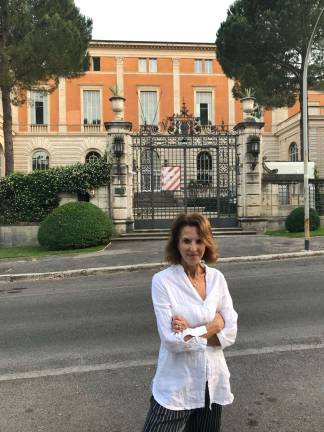back to school, after 40 gap years

Carrying a bag full of books, I would often run into people in the early morning, and they’d ask where I was going. When I said “Columbia,” the response would inevitably be, “What are you teaching?”
In fact, I was learning.
Entering my 60s, I enjoyed a fairly successful career as a freelance writer, had raised two children and led a busy social life. But when the second child went off to college, an old gnawing regret — that I had not finished college myself — rose to the surface. With an empty nest looming — a time when many peers were considering retirement — I wondered if this might be the time to go back to school.
When I had attended the University of California, I was, at best, a lax student, focused on everything but my classes. Then I got involved volunteering with Robert Kennedy’s presidential campaign and was so devastated by his death that my parents suggested I take a gap year. Who knew it would turn out to be 40 of them?
My return began gently: taking a single class at a time at Marymount Manhattan. After three of those, I received, unsolicited, an email from Columbia University, asking if I was familiar with its General Studies Program. I went to a meeting, applied, aced my entrance exam and was accepted.
For about five years, I dove into it, generally taking two classes at a time. These courses were always interesting, if stress-inducing. Not the least for technical reasons: figuring out the school’s internet system was a killer. Happily, several of my professors were also constantly seeking tech help from students. One day, I walked into a class and the prof said, “Michele, do you have a memory chip?” I said, “Are you kidding? I don’t even have a memory.”
In fact, my self-esteem was enhanced, and my aging anxieties relieved, by my school experience. I am still amazed that I was able to memorize historical names and dates, recognize countless paintings and classical musical compositions. I now not only know how to spell mnemonics, I am a devoted master. Cramming was in no way fun, though my husband took great joy in telling friends, “Michele can’t make it because she’s studying for finals.”
Ultimately, I left Columbia for two reasons: First, it does not have online classes for undergraduates, and suddenly, my life was filled with travel opportunities. Second, it has a core curriculum, which means you don’t move on without science and math classes. I was hopeless at those in high school, so why would I be better now? The only C that I received in all my Columbia classes was in a science-based psychology class. Trust me, I was relieved and gratified.
On the other hand, one of the happiest days of my life was when I took an “Incomplete” for a ridiculously comprehensive science class (after flunking the midterm), and tossed out all my study papers in a wastebasket. I would never again need to identify all the parts of the eyes and ears, the millions of neurotransmitters and whatever the hell the hippocampus does. (Not enough for me, obviously.)
So I moved on to The New School, which has online classes and no core demands. I have suddenly become much busier in my professional life, so for now, I am taking yet another gap. Do I miss the classes? Sometimes, though writing 10-page papers and weekly reports does not necessarily get easier. But every class has proved beneficial. For my last one, entitled simply “Elena Ferrante,” I read all the books, wrote four papers, and now I am watching the HBO version with accumulated expertise. Similarly, I was recently at the Medici Palace in Florence, when I came upon a particular painting of Raphael’s. I found myself explaining to my husband when and why it was painted in that style.
Which is ultimately what going back to school has done for me. Not only have I expanded my knowledge, but my written journalism and radio reports have improved, with more depth and critical thinking. Even the harrowing psychology class informed my articles dealing with women and aging.
As for being the oldest person in the classroom (including most of the professors), that has its ups and downs. Most students at Columbia showed little interest in me, even rolling their eyes when I was put in their study groups. (They tended to get over it when they saw I could edit our projects, and had a car to drive us to field trips.)
Will I go back and get the damn degree? I can’t promise. In the meantime, I have earned a new hyphenate: I was just accepted as a “visiting artist-scholar” for a month at the American Academy in Rome. I like the sound of that!